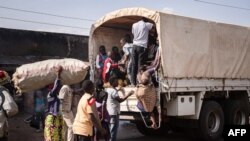The United Nations High Commissioner for Refugees (UNHCR) and 69 aid organizations launched a regional plan seeking to support Congolese refugees in the DRC’s neighboring countries across the southern and Great Lakes regions.
"With the Democratic Republic of the Congo continuing to experience one of Africa’s most complex and long-standing humanitarian crises," UNHCR said in statement, the agency launched a "Regional Refugee Response Plan (RRRP) to provide urgent humanitarian assistance and protection to refugees from the country in 2023."
UNHCR said more than 1 million Congolese refugees and asylum-seekers are hosted across the African continent, many living in Uganda, Rwanda, Burundi, Tanzania, Republic of the Congo and Angola.
According to the agency the majority of Congolese refugees live in Uganda, totaling 479,400.
"In 2022 alone, attacks by armed groups in eastern DRC led to the exile of some 98,000 refugees to Uganda," UNHCR said, adding "settlements and camps have reached or exceeded capacity in many refugee host countries."
Aid partners and the UNHCR say the aid assistance will provide protection, shelter, food, health, education and other basic services to refugees in the region.
"Food insecurity is a growing concern as people struggle to afford necessities due to rising prices linked to the impacts of the conflict in Ukraine," the UNHCR said.
Fighting in eastern DRC between the March 23 Movement (M23) rebels and government forces has continued.
Since late 2021, M23 has seized swathes of territory in North Kivu province and neared the regional hub of Goma, prompting hundreds of thousands to flee their homes.
"In the eastern provinces, where more than 132 non-state armed groups operate, the majority of the displaced are hosted in warehouses, schools, churches or within host communities,"the UNHCR said.
Since March 2022, at least 521,000 people have been forced to flee in North Kivu province, according to the UNHCR, and more than 5.8 million are internally displaced by conflict.
Some information in this report came from Agence France-Presse.
